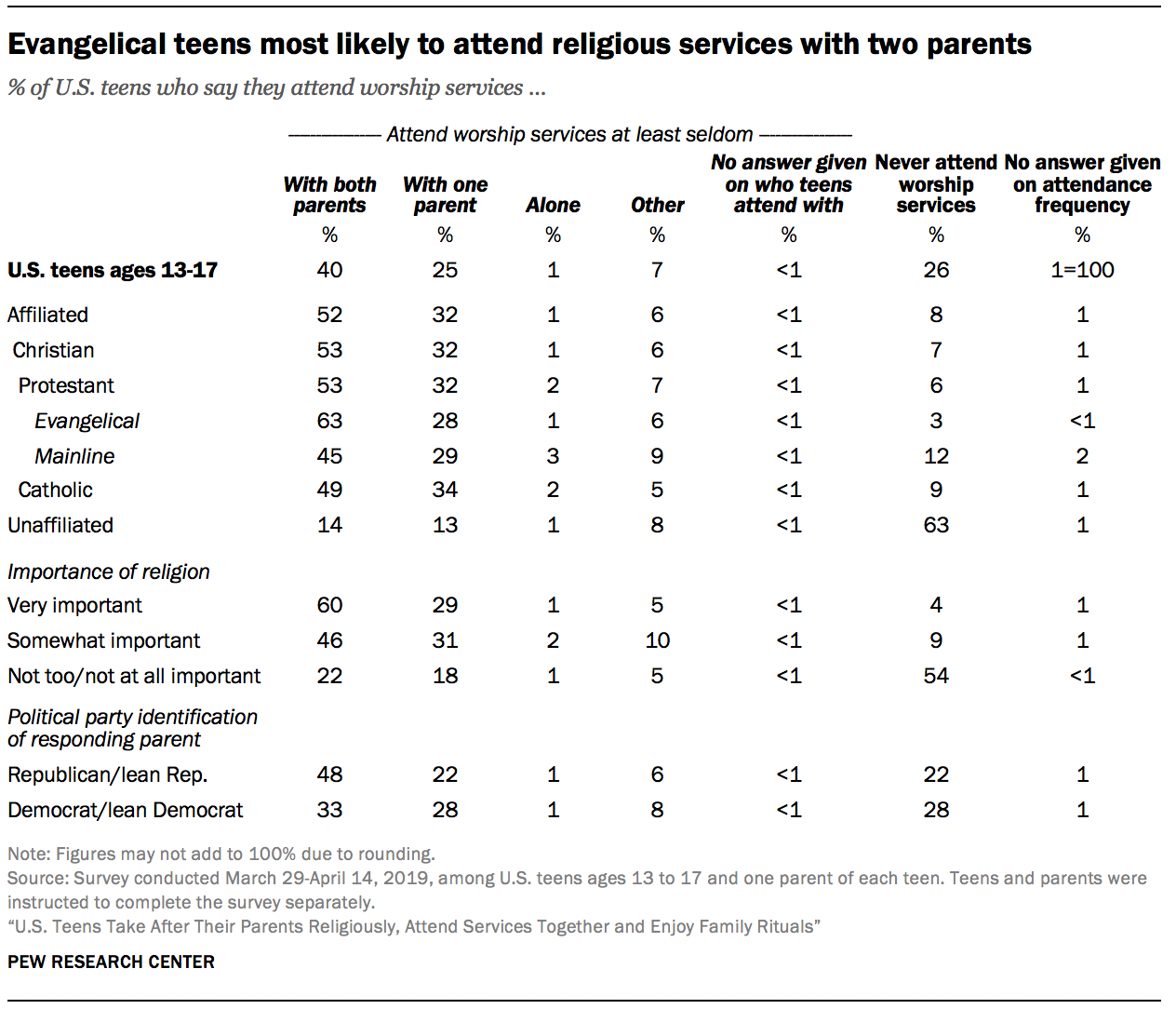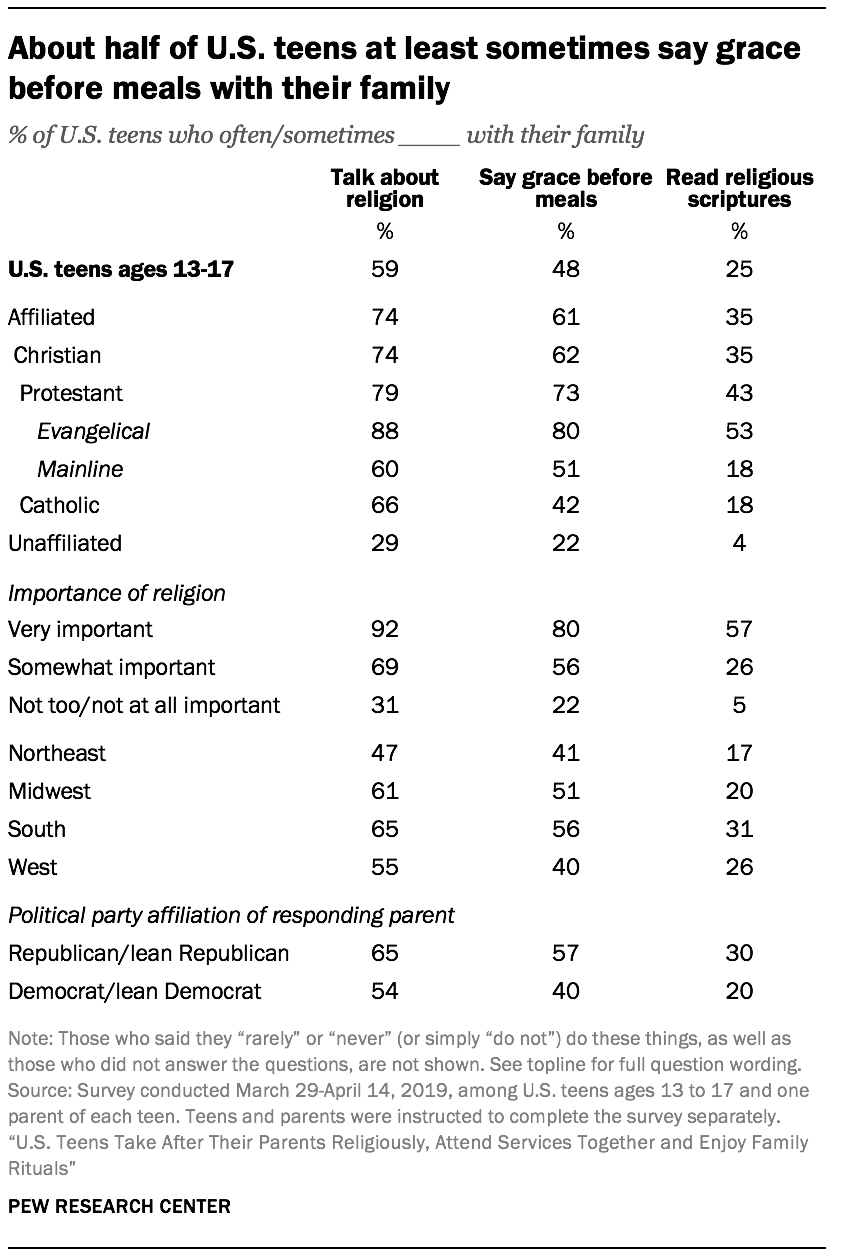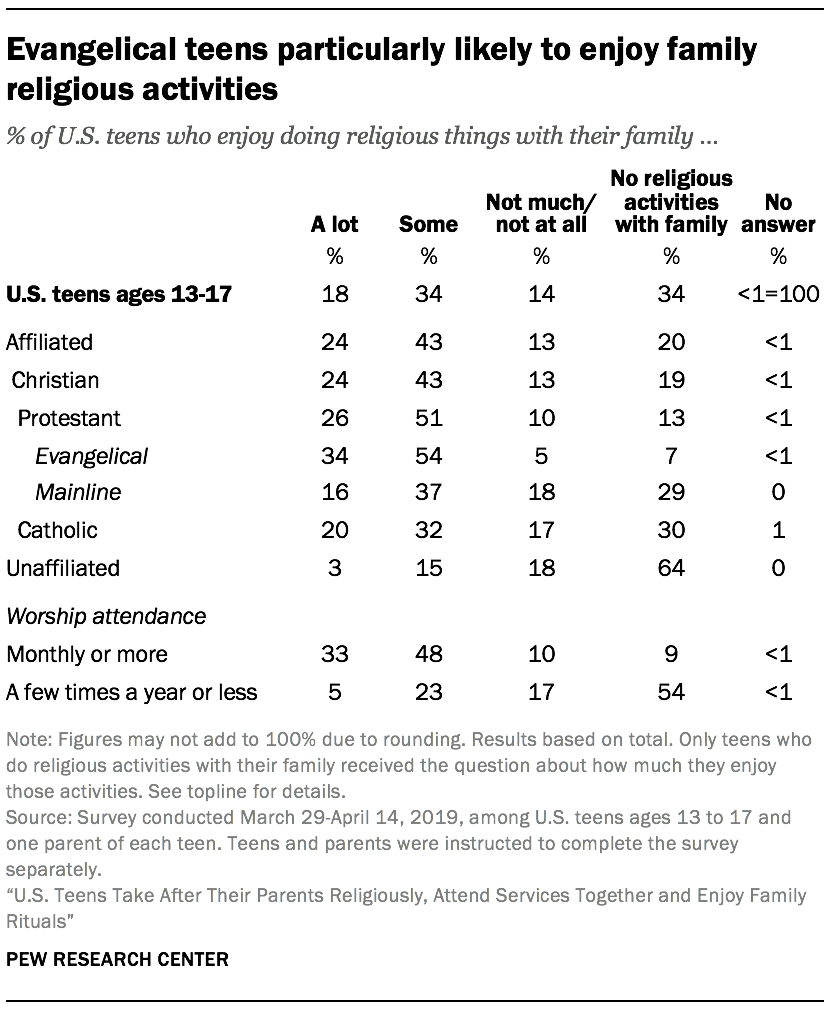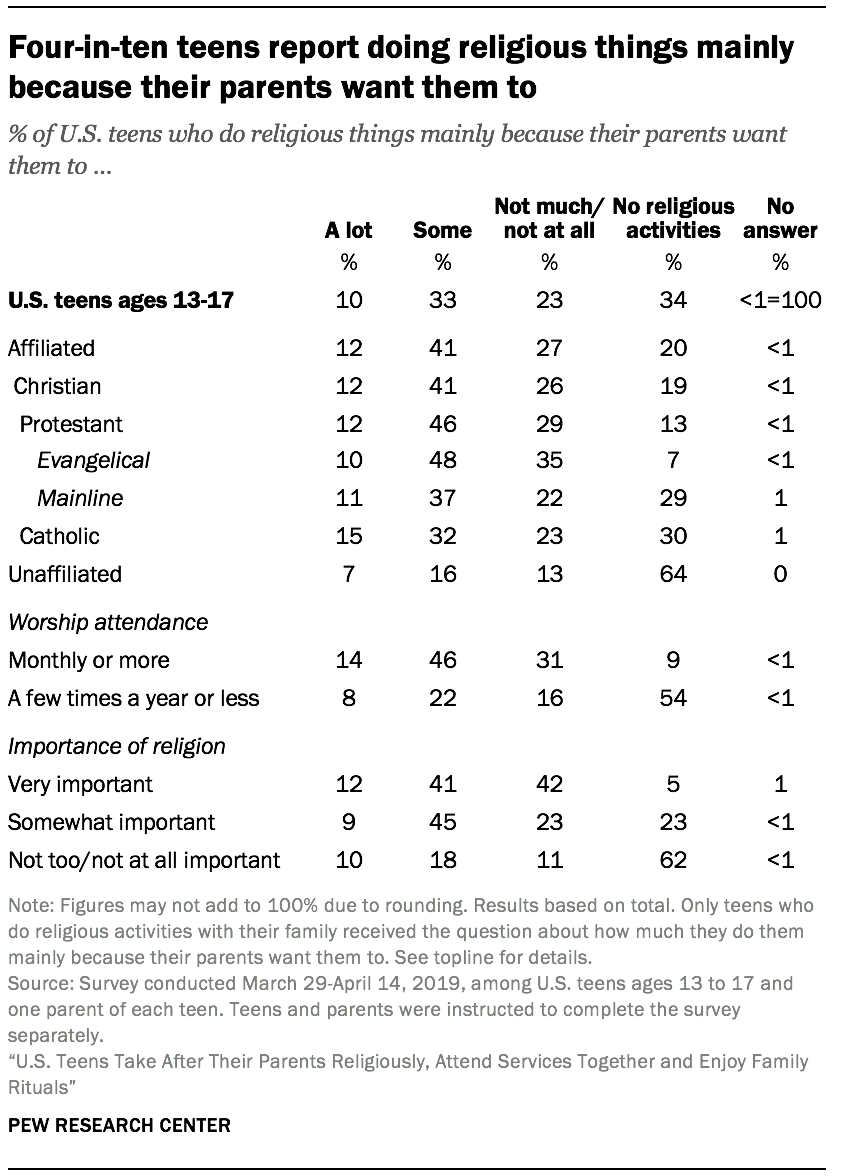Children’s religious practices are tied to their families’ traditions.28 To better understand these links, the survey asked teens a variety of questions about who they attend worship services with, what types of religious activities they participate in with their families and why they participate (including whether they enjoy those activities).
Four-in-ten teens attend religious services with two parents. Still, a quarter of teens attend with only one parent. Saying grace – a prayer or blessing before a meal – with the family is relatively common, with about half of teens saying their family does this at least sometimes. Reading religious scripture together as a family is less common, with only a quarter saying they do that at least sometimes (though roughly half of teens who regularly attend services report reading scripture with their families sometimes or often).
Religion plays a central role in many families, with six-in-ten teens reporting that their families often or sometimes talk about religion. Teens who say religion is important in their lives are especially likely to talk with their families about religion, while religiously unaffiliated teens rarely do so. And many teens appear to appreciate religious activities with their families, as half say they enjoy doing religious things with their families “a lot” or “some.” Still, about four-in-ten report that they at least sometimes do religious things mainly because their parents want them to.
A quarter of teens attend religious services with only one parent
The survey finds that most American teenagers at least occasionally attend worship services (see Chapter 3), but it also digs deeper, asking teens who attend religious services even on an infrequent basis (at least “seldom”): When you go, who do you go with? Four-in-ten teens say they attend with both parents, while a quarter report attending with one parent. An additional 7% generally attend with other people, such as grandparents, other family members or friends. Very few teens (1%) attend worship services alone. (The remainder – about a quarter – say they never attend religious services or decline to answer the question.)29
Among evangelical Protestant teens, about six-in-ten attend worship services with both parents, making them the most likely to do so among the religious groups this survey is able to analyze. Fewer Catholic (49%) and mainline Protestant (45%) teens say they attend with both parents. Although relatively few unaffiliated adolescents ever attend services, those who do are about equally likely to report attending with both parents (14% of all unaffiliated teens) or one parent (13%).30
Six-in-ten teens who say religion is very important in their lives attend with both parents. By comparison, 46% of teens who say religion is somewhat important to them and 22% of those who say religion is not too or not at all important attend with both parents; 54% in this latter group say they never attend religious services with anybody.
About half of all teens with a Republican or Republican-leaning parent (48%) report attending worship services with both parents. By comparison, a third of teens with a responding parent who is a Democrat attend with both parents. Children of Democrats are more likely than those of Republicans either to attend with only one parent or never to go to worship services.

Evangelical teens most likely to engage in religious activities as a family
 Social scientists suggest that religion is a social phenomenon that is often enacted with one’s family.31 With this in mind, the survey asked teens a few questions about whether (and how often) they participate in some religious activities with their family.
Social scientists suggest that religion is a social phenomenon that is often enacted with one’s family.31 With this in mind, the survey asked teens a few questions about whether (and how often) they participate in some religious activities with their family.
Most U.S. teens (59%) say they talk about religion with their family at least “sometimes,” including about one-in-five who do this “often.” The remainder do so “rarely” (28%) or “never” (12%).
Fewer American adolescents at least sometimes say grace –or a prayer of thanks – before meals with their family (48%).32 But teens are more likely to report that they often say grace than that they often talk about religion with their family (30% vs. 19%). Teens also are much more likely to indicate that they do not say grace than they are to say they never talk about religion with their family (45% vs. 12%). In other words, teens are most likely to say grace with their family either often or not at all, while most talk about religion with their family either sometimes or rarely.
Reading religious scripture together as a family is much less common. A quarter of U.S. adolescents say they do this with their family at least sometimes, while 71% say they do not do this.
Evangelical Protestant teens are much more likely than others to do all three of these things. For instance, eight-in-ten evangelical teens say they at least sometimes say grace before meals with their family (including six-in-ten who report that they often do this). Far fewer mainline Protestant (51%) and Catholic (42%) teens at least sometimes say grace at mealtime.
Religiously unaffiliated teens are especially unlikely to engage in any of these behaviors. Although most unaffiliated teens say they talk about religion with their families at least on rare occasions, large majorities in this group report that they say they do not say grace before meals (72%) or read religious scripture (93%) with their family.
Not surprisingly, teens who describe religion as very important in their lives are much more likely than other teens to talk about religion, say grace before meals and read religious scripture with their family on a regular basis.33 Still, only a third of those who say religion is very important to them also say they often read religious scripture with their family.
There also are clear and consistent patterns on these questions depending on the geographic region where teens live and the political party of their responding parent. Teens in the South are more likely than those in the Northeast in particular to participate in all these family activities. And teens whose responding parent is a Republican (or leans Republican) tend to talk about religion, say grace and read scripture with their families at higher rates than those whose responding parent is a Democrat or leans Democratic.
Most teens who do religious things with family say they enjoy them at least ‘some,’ but many also say they sometimes participate at parents’ behest
 The remaining analyses in this chapter examine how adolescents who do religious things with their families feel about these activities.34 Do they enjoy doing them? Do they do them primarily because their parents want them to?
The remaining analyses in this chapter examine how adolescents who do religious things with their families feel about these activities.34 Do they enjoy doing them? Do they do them primarily because their parents want them to?
Most teens who do religious things with their families appear to get at least some enjoyment out of them. About one-in-five U.S. teens (18%) say they enjoy doing religious things with their families “a lot,” and a third enjoy them “some” (34%). Just 14% say they enjoy them “not much” or “not at all,” while the remaining one-third of teens do not do any religious activities with their families.
Few unaffiliated teens (3%) enjoy doing religious things with their families a lot, and only 15% enjoy doing them some. These low numbers partly reflect the fact that about two-thirds of unaffiliated teens do not do religious things with their families at all. Still, about half of all unaffiliated teens who do participate in religious activities with their families (18% of all unaffiliated teens) say they do not enjoy them much or at all.
Among the major Christian traditions, evangelical Protestant teens are particularly likely to enjoy doing religious things with their families. About nine-in-ten evangelical teens enjoy doing religious things with their families a lot (34%) or some (54%), while just 5% say they do not enjoy them much or at all. By comparison, larger shares of mainline Protestant and Catholic teens say they participate in religious activities with their family but do not enjoy them (18% and 17%, respectively).
Worship service attendance also is associated with how much adolescents enjoy doing religious things with their families. Among teens who attend religious services once or twice a month or more, 81% say they find at least some enjoyment doing religious things with their families. Conversely, seven-in-ten teens who attend services less often either do not enjoy doing religious things with their families (17%) or do not do religious things with their families (54%).
 While most teens who partake in religious activities with family seem to derive at least some enjoyment from them, most in this group also say they participate at least in part because their parents want them to.
While most teens who partake in religious activities with family seem to derive at least some enjoyment from them, most in this group also say they participate at least in part because their parents want them to.
One-in-ten teens say they do religious things mainly because their parents want them to “a lot,” while a third do so “some” of the time. Just 23% say they rarely or never do religious things mainly because their parents want them to. (The remaining one-third of teens never participate in religious activities with their families.)
Similar shares of evangelicals, mainline Protestants and Catholics say they do religious things because their parents want them to “a lot.” Mainline Protestants and Catholics, by contrast, are much more likely than evangelicals to say they simply don’t do religious things with their family.
Six-in-ten teens who attend religious services at least monthly say their reason for doing religious things with their family has either a lot (14%) or some (46%) to do with their parents wanting them to. The same is true of roughly half of teens who say religion is very important in their lives (12% and 41%, respectively).


